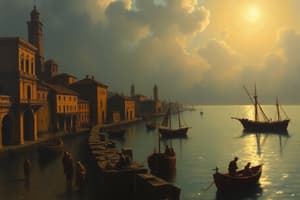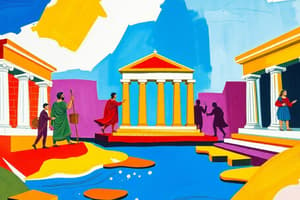Podcast
Questions and Answers
What significant political change occurred in Rome in 509 BCE?
What significant political change occurred in Rome in 509 BCE?
- The rise of plebeian power
- The establishment of a monarchy
- The founding of the Roman Republic (correct)
- The founding of the Roman Senate
Which group primarily dominated the Roman Senate and officer corps?
Which group primarily dominated the Roman Senate and officer corps?
- Plebians
- Merchants
- Patricians (correct)
- Etruscans
What was the Comitia Centuriata in the Roman Republic?
What was the Comitia Centuriata in the Roman Republic?
- An assembly of the wealthy elite
- A military assembly that elected consuls (correct)
- A council of plebeian leaders
- A group of tribal leaders
What were the Punic Wars primarily about?
What were the Punic Wars primarily about?
Which socio-economic groups existed in Rome, and how were they defined?
Which socio-economic groups existed in Rome, and how were they defined?
What was a significant outcome of the Macedonian Wars?
What was a significant outcome of the Macedonian Wars?
Why were the patricians concerned about Julius Caesar's power?
Why were the patricians concerned about Julius Caesar's power?
What was one of the main reasons for the assassination of Julius Caesar?
What was one of the main reasons for the assassination of Julius Caesar?
What did Julius Caesar manage to accomplish during the civil wars?
What did Julius Caesar manage to accomplish during the civil wars?
Which historical figure followed Julius Caesar and also played a significant role in Roman history?
Which historical figure followed Julius Caesar and also played a significant role in Roman history?
What was the outcome of Augustus Caesar's civil war victory in 31 BCE?
What was the outcome of Augustus Caesar's civil war victory in 31 BCE?
Which statement best describes the government under Augustus Caesar?
Which statement best describes the government under Augustus Caesar?
What does the term 'Pax Romana' refer to?
What does the term 'Pax Romana' refer to?
What contributed to the decline of the Western Roman Empire?
What contributed to the decline of the Western Roman Empire?
What was a significant ecological factor in the decline of the Western Roman Empire?
What was a significant ecological factor in the decline of the Western Roman Empire?
Which peoples were primarily responsible for pushing Germanic tribes westward during the 300s-400s?
Which peoples were primarily responsible for pushing Germanic tribes westward during the 300s-400s?
How did Augustus Caesar's reign differ from traditional republican values?
How did Augustus Caesar's reign differ from traditional republican values?
What term describes the Germanic tribes living beyond the Roman borders?
What term describes the Germanic tribes living beyond the Roman borders?
What effect did the invasions by various tribes, including the Goths and Franks, have on Italy?
What effect did the invasions by various tribes, including the Goths and Franks, have on Italy?
Which king is noted for adopting Roman Catholic Christianity around 496?
Which king is noted for adopting Roman Catholic Christianity around 496?
What significant action did Emperor Constantine take regarding Christianity during his reign?
What significant action did Emperor Constantine take regarding Christianity during his reign?
What is 'caesaropapism' as it pertains to Justinian's reign?
What is 'caesaropapism' as it pertains to Justinian's reign?
What major architectural achievement is associated with Justinian?
What major architectural achievement is associated with Justinian?
Which historical figure is referred to as the 'new Constantine' by St. Gregory of Tours?
Which historical figure is referred to as the 'new Constantine' by St. Gregory of Tours?
What was the result of the Edict of Milan?
What was the result of the Edict of Milan?
What aspect of the Justinian Code significantly influenced future legal systems?
What aspect of the Justinian Code significantly influenced future legal systems?
Flashcards are hidden until you start studying
Study Notes
Rome & the Mediterranean
- Romans descended from the Latins who occupied the Tiber River Valley
- The Latins borrowed their alphabet, military formations, and architecture from the Etruscans
- The Roman Republic was founded in 509 BCE and ended the Etruscan rule
- Rome’s population consisted of two main classes, the Patricians (Aristocrats who traced their lineage back to the City of Rome) and the Plebians (Everyone else)
- Patricians dominated areas of power, such as the Senate, Military and Economy
- Early Roman imperialism relied on the Punic Wars, to make sure Rome was firmly planted in the Western Mediterranean sea and North Africa
- The Macedonians were defeated in a series of four wars and ended up as a roman province in 146 BCE, a major step towards the Roman Empire.
Roman Civil Wars
- Julius Caesar was a Roman general who survived the internal civil wars, ending them for a period, and becoming popular with his troops
- Caesar was assassinated in 44 BCE by Patricians that feared his power and rise to Kingship.
- Octavian a.k.a. Augustus Caesar, the adopted son of Julius Caesar, won a Civil War in 31 BCE and maintained the structure of the Roman Republic but kept power within his own hands.
- The Pax Romana, or Roman Peace, lasted until 181 CE, though the era has been disputed by historians
Roman Citizenship, Law, & Society
- The Roman Empire grew in size and influence throughout the Western Mediterranean Sea and beyond
- Factors that contributed to its demise included (but not limited to): political turmoil, plagues, reliance on imports and cooler climate.
Barbarian Invasions
- Germanic tribes such as the Marcomanni, Alemani, & Goths, lived beyond the Roman Empire's frontiers.
- Around the 300s-400s the Germanic tribes were pushed westward by the rise of the Huns (Under Attila)
- The decline of the Roman Empire led to tribes such as the Vandals, Visigoths, Ostrogoths, Lombards, Suebi, Franks, Saxons and many others taking over and establishing new kingdoms in the collapsed Empire
- The Church became the main surviving center of social organization
Clovis & The Franks
- The Franks lived in the Roman Province of Gaul, later known as Francia (modern France)
- Frankish King Clovis converted to Roman Catholicism in 496, which gave him legitimacy alongside military support from the Church
- The History of the Franks, written by St Gregory of Tours, a book that described Clovis as a new Constantine
The Byzantine Empire
- Constantine fought civil wars for control of the Roman Empire (304-324 BCE)
- He attributed his victory at the Milvian Bridge to the Christian God (312 BCE)
- The Edict of Milan legalized Christianity in the Roman Empire (313)
- Constantine moved the capital of the Roman Empire from Rome to Byzantium (Later Constantinople)
- Constantine was baptized on his Deathbed (337 BCE)
Justinian
- Emperor Justinian ruled from 527-565, reconquering much of the Roman Empire lost in the previous century
- Justinian was considered Autocratic but effective
- He believed the Roman Emperor was the head of the Christian Church (Cesaeropapism)
- He constructed the Hagia Sophia, the largest church of the era
- The Justinian Code was a compilation of the laws of the Roman Empire, that formed the basis of law in the Eastern Roman Empire.
Studying That Suits You
Use AI to generate personalized quizzes and flashcards to suit your learning preferences.





